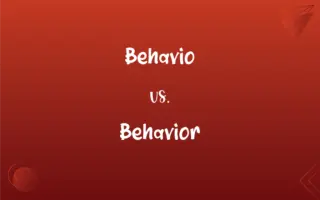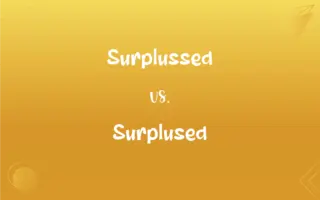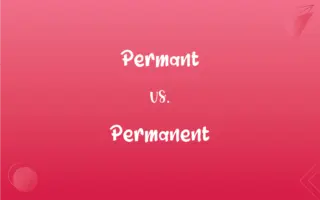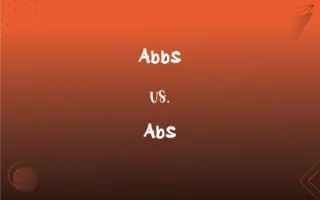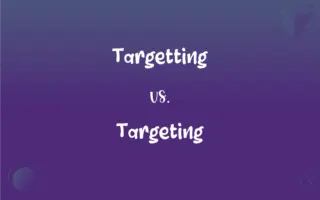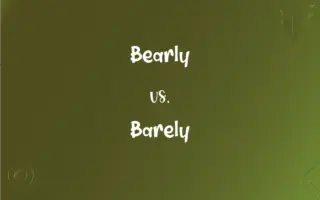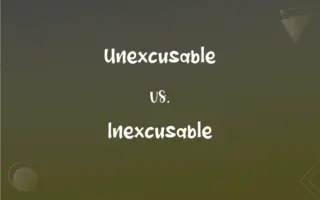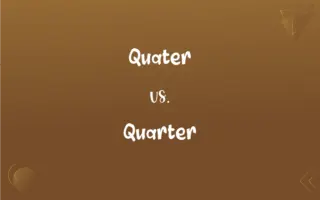Capible vs. Capable: Mastering the Correct Spelling
Edited by Aimie Carlson || By Janet White || Updated on March 11, 2024
"Capible" is an incorrect spelling. The correct spelling is "Capable," meaning having the ability or capacity to do something.
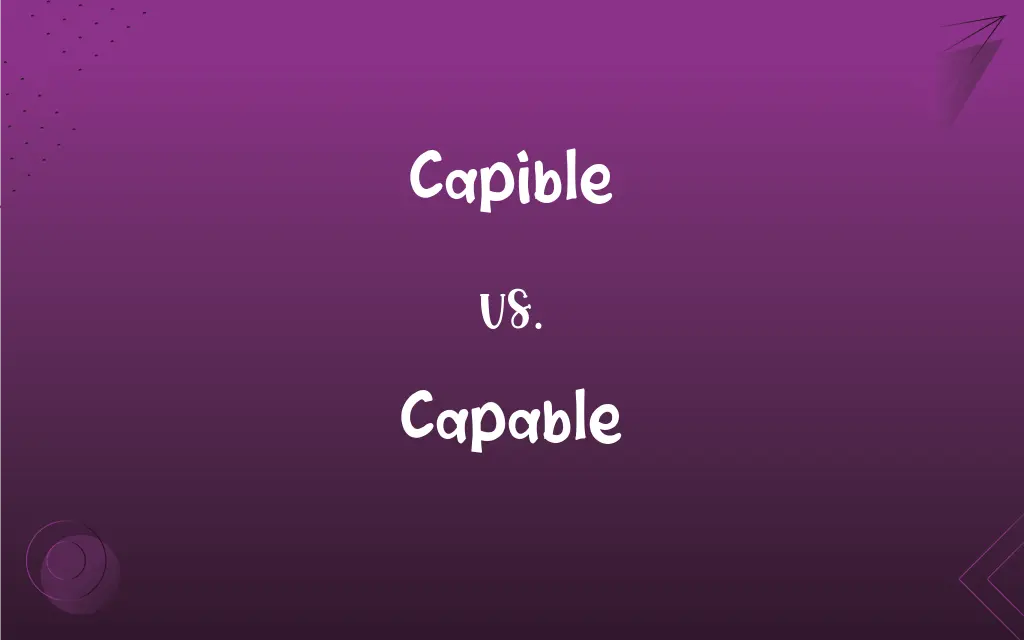
Which is correct: Capible or Capable
How to spell Capable?

Capible is Incorrect

Capable is Correct
ADVERTISEMENT
Key Differences
Associate "capability" with "capable."
Think of "able" which is itself a correct word.
The word "cap" plus "able" form "capable."
Remember "Cap-Able" indicating someone or something is able to perform.
Visualize a "cap" on a person who is "able" to do tasks, forming "capable."
ADVERTISEMENT
Correct usage of Capable
Are you capible of solving this complex math problem?
Are you capable of solving this complex math problem?
He felt he wasn't capible enough to lead the project successfully.
He felt he wasn't capable enough to lead the project successfully.
His new phone is very capible of handling all the latest apps.
His new phone is very capable of handling all the latest apps.
She wasn't sure if she was capible to complete the marathon.
She wasn't sure if she was capable to complete the marathon.
The team seemed quite capible of winning the championship this year.
The team seemed quite capable of winning the championship this year.
Capable Definitions
Capable means having the power or ability to do something.
He's capable of finishing the marathon.
It denotes potential or suitability for a task.
This device is capable of high-speed data transfer.
Capable implies being qualified or fit.
The soldier is capable of serving in difficult conditions.
It can refer to someone having the skills required.
She is a capable engineer.
Capable suggests competence in a specific area.
The team is capable of winning the championship.
Having capacity or ability; efficient and able
A capable administrator. See Usage Note at able.
Having the ability required for a specific task or accomplishment; qualified
Capable of winning.
Having the inclination or disposition
Capable of violence.
Permitting an action to be performed
An error capable of remedy.
A camera capable of being used underwater.
Able and efficient; having the ability needed for a specific task; having the disposition to do something; permitting or being susceptible to something.
She is capable and efficient.
He does not need help; he is capable of eating on his own.
As everyone knew, he was capable of violence when roused.
That fact is not capable of proof.
(obsolete) Of sufficient capacity or size for holding, containing, receiving or taking in; accessible to. Construed with of, for or an infinitive.
Possessing ability, qualification, or susceptibility; having capacity; of sufficient size or strength; as, a room capable of holding a large number; a castle capable of resisting a long assault.
Concious of joy and capable of pain.
Possessing adequate power; qualified; able; fully competent; as, a capable instructor; a capable judge; a mind capable of nice investigations.
More capable to discourse of battles than to give them.
Possessing legal power or capacity; as, a man capable of making a contract, or a will.
Capacious; large; comprehensive.
(usually followed by `of') having capacity or ability;
Capable of winning
Capable of hard work
Capable of walking on two feet
Possibly accepting or permitting;
A passage capable of misinterpretation
Open to interpretation
An issue open to question
The time is fixed by the director and players and therefore subject to much variation
(followed by `of') having the temperament or inclination for;
No one believed her capable of murder
Having the requisite qualities for;
Equal to the task
The work isn't up to the standard I require
Have the skills and qualifications to do things well;
Able teachers
A capable administrator
Children as young as 14 can be extremely capable and dependable
Capable Sentences
The computer is capable of processing millions of operations per second.
She's capable of making her own decisions.
This tool is capable of cutting through metal.
The artist is capable of drawing very realistic portraits.
He's capable of playing multiple musical instruments.
The company is capable of producing a large number of units in a day.
The student is capable of achieving high grades with enough effort.
The new software is capable of detecting errors automatically.
He is capable of running very fast.
This vehicle is capable of off-road driving.
The phone's battery is capable of lasting all day on a single charge.
The organization is capable of hosting large events.
The garden is capable of producing a variety of fruits and vegetables.
He's capable of cooking complex meals without a recipe.
The machine is capable of recycling materials without waste.
The athlete is capable of breaking the current world record.
She proved to be capable of handling the crisis efficiently.
The security system is capable of monitoring the entire building 24/7.
She's capable of speaking multiple languages fluently.
This software is capable of translating text in real-time.
The teacher is capable of explaining difficult concepts in simple terms.
The author is capable of writing captivating stories.
He's capable of resolving conflicts peacefully.
The team is capable of performing under pressure.
The program is capable of teaching kids basic coding skills.
FAQs
What is the root word of Capable?
The root is the Latin "capabilis."
What is the pronunciation of Capable?
/ˈkeɪpəbəl/
Which vowel is used before Capable?
It depends on context. For example, "a" as in "a capable person."
Which conjunction is used with Capable?
Any conjunction can be used depending on the context.
What is the singular form of Capable?
"Capable."
What is the plural form of Capable?
N/A. "Capable" is an adjective and does not have a plural form.
Is Capable an abstract noun?
No.
Is Capable a negative or positive word?
Generally positive.
Which article is used with Capable?
Both "a" and "the" can be used.
Is Capable a noun or adjective?
Adjective.
What is the verb form of Capable?
There isn't a direct verb form of "capable." However, related verbs include "capacitate" and "enable."
Why is it called Capable?
The term "capable" comes from the Latin word "capabilis," meaning "that can hold or contain."
Is Capable an adverb?
No.
Is Capable a countable noun?
No, it's an adjective.
Is the word Capable imperative?
No.
Which preposition is used with Capable?
"Of" as in "capable of."
Is the Capable term a metaphor?
Not inherently, but it can be used metaphorically.
What part of speech is Capable?
Adjective.
Is Capable a collective noun?
No.
Which determiner is used with Capable?
"This" or "that" can be used.
Is Capable a vowel or consonant?
"Capable" is a word and contains both vowels and consonants.
What is another term for Capable?
Competent.
What is the first form of Capable?
"Capable" (it's an adjective).
How is Capable used in a sentence?
She is capable of solving complex problems efficiently.
How many syllables are in Capable?
Three syllables.
What is the opposite of Capable?
Incapable.
What is the third form of Capable?
N/A as "Capable" is an adjective.
How do we divide Capable into syllables?
Ca-pa-ble.
What is a stressed syllable in Capable?
The first syllable, "Ca."
What is the second form of Capable?
N/A as "Capable" is an adjective.
About Author
Written by
Janet WhiteJanet White has been an esteemed writer and blogger for Difference Wiki. Holding a Master's degree in Science and Medical Journalism from the prestigious Boston University, she has consistently demonstrated her expertise and passion for her field. When she's not immersed in her work, Janet relishes her time exercising, delving into a good book, and cherishing moments with friends and family.
Edited by
Aimie CarlsonAimie Carlson, holding a master's degree in English literature, is a fervent English language enthusiast. She lends her writing talents to Difference Wiki, a prominent website that specializes in comparisons, offering readers insightful analyses that both captivate and inform.
